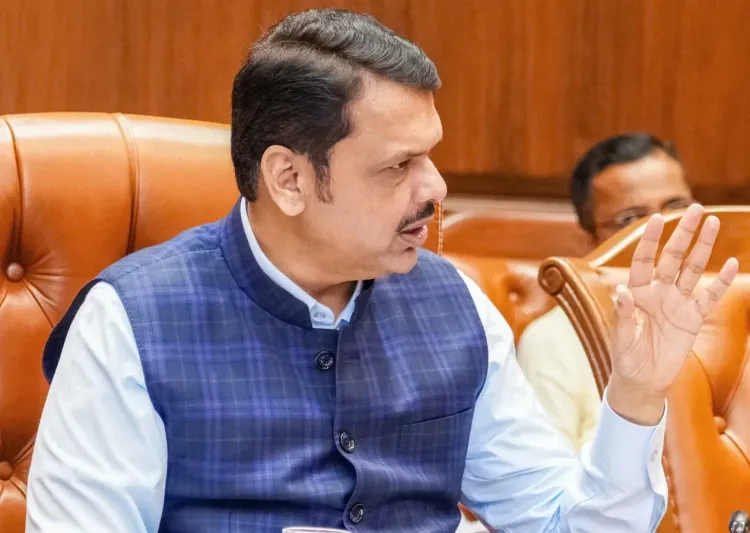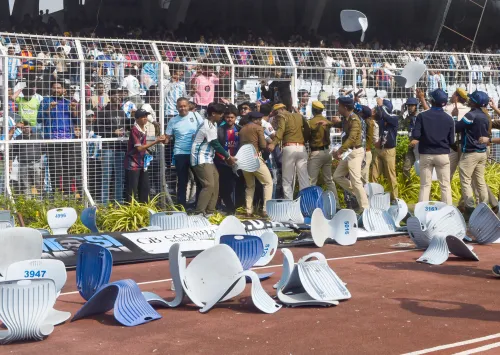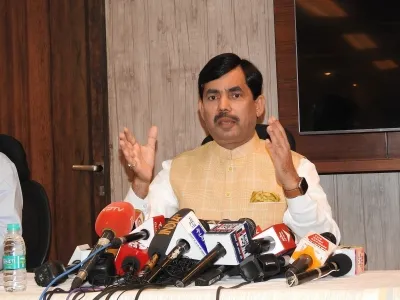How is CM Fadnavis Ensuring Timely Subsidies for Mahavitaran?

Synopsis
Key Takeaways
- CM Fadnavis directed immediate subsidy releases for Mahavitaran.
- Proper planning in the Energy Department is essential for fair electricity rates.
- Industrial tariffs in Maharashtra are among the lowest nationally.
- Smart meters will enhance monitoring of agricultural electricity use.
- New solar schemes are being introduced to assist farmers.
Mumbai, July 17 (NationPress) In light of the increasing arrears owed by the state-operated Maharashtra State Electricity Distribution Company (Mahavitaran) related to electricity bills from agricultural and other consumers, Chief Minister Devendra Fadnavis on Thursday urged the Finance Department to expedite the release of subsidies to Mahavitaran at the earliest.
He emphasized that with proper planning from the Energy Department regarding power generation and expenses, it is feasible to provide electricity at reasonable rates to consumers. This statement was made during a review meeting of the Energy Department that he chaired.
Present at the meeting was Minister of Non-Conventional Energy, Atul Save.
During the review, CM Fadnavis assessed the funding needs of the Energy Department for the fiscal year 2025-26, the electricity payment arrears of various departments, the current status of grant distributions, funding provisions for various schemes, and actions taken by the Maharashtra Energy Development Agency (MEDA).
The Chief Minister stated: “The Finance Department must promptly verify all details in the comprehensive proposal requested from them to implement the Energy Department scheme and ensure timely fund distribution. To enhance the financial health of the state’s power distribution system, necessary adjustments should be made as per regulations. Measures must be taken to recover arrears promptly. It is crucial to manage the disparity between the funds approved for Mahavitaran and the deficits effectively.”
He further mentioned that funds are essential for the successful execution of the Chief Minister Baliraja Free Electricity Scheme and the PM Kusum Scheme. Thus, the Finance Department should evaluate the requests made by the Energy Department. Additionally, it is vital to implement measures that ensure relief to general electricity consumers through appropriate rate determinations.
Previously, CM Fadnavis announced that the industrial electricity tariff in Maharashtra would be the most competitive compared to other states. Following the new tariff structure, Maharashtra's current tariff of Rs 8.32 is projected to drop to Rs 7.38 in the subsequent phase.
This is in contrast to Tamil Nadu's rate of Rs 9.04, Gujarat's Rs 8.98, and Karnataka's Rs 7.55. The industrial electricity tariff in Maharashtra is expected to remain low in the coming years, and the tariff will not rise due to the tariff true-up process, he added. CM Fadnavis, who oversees the Energy Department, stated that electricity procurement will transition to the 'Merit Order Dispatch' method.
This strategy allows for purchasing electricity from private entities at reduced costs. Moreover, the expenses associated with electricity procurement have significantly decreased due to the integration of solar, wind, and battery storage technologies. As this is a long-term (25-year) contract, electricity rates are anticipated to remain stable, he noted.
CM Fadnavis mentioned that the previous tariff petition resulted in reduced industrial and commercial tariffs, which inadvertently shifted burdens onto residential consumers. However, following objections from the Maharashtra State Electricity Distribution Company (Mahavitaran), recent orders from the Maharashtra Electricity Regulatory Commission have led to tariff reductions across all categories.
“Approximately 70% of consumers use up to 100 units of electricity and will benefit from a 26% rate reduction. There will also be a reduced rate for consumption exceeding 100 units,” he stated.
“Significant modifications have been made to solar pump schemes for farmers, with a new scheme for booster pumps being introduced. The cost for the single pole scheme is only Rs 15,000. Farmers can be provided with 10 HP solar pumps based on their requirements. Any complaints regarding this are being addressed through the Solar Unified Portal,” said the chief minister.
CM Fadnavis announced that smart meters will be deployed in the agricultural sector to monitor electricity usage. This initiative will facilitate precise understanding of electricity consumption in agriculture, aiding in the development of future policy frameworks, he added.
According to the chief minister, a distinct solarisation proposal has been drafted for lift irrigation, and provisions for electricity via traditional means in dark zones will also be examined.










